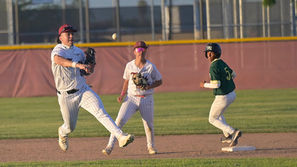Madera disappointed Fresno on the 4th
- Bill Coate
- Oct 16, 2019
- 4 min read

Madera County Historical Society
In 1889, there was no crowd at the Yosemite Hotel to greet the folks from Fresno who had come to celebrate the 4th of July, much to their disappointment.
The special train to Madera which was advertised to leave Fresno at 8 o’clock on the morning of July 4th, 1889, did not leave until about 9:30, but that was only the first of many indignities that the Fresno folks would suffer that day.
According to a Fresno newspaperman, “Every one of the six passenger coaches was filled to overflowing with perspiring humanity who endured the wait of an hour and a half with remarkable fortitude and patience.”
It’s a pity our neighbors to the south didn’t have a clue as to how disappointed they would really be before it was all over. The Fresno Expositor’s reporter recounted the entire affair.
The arrival of the train at Madera
“Our arrival in Madera was followed by a shock which was very much like pouring a pitcher of ice water down our necks. Usually, when two companies of local militia, accompanied by from 400 to 600 citizens, leave a city to visit, at their own expense, a country village and make a Fourth of July celebration for it, there is at the depot to meet the visitors a reception committee of some sort to welcome the guests. Not so at Madera!
“The National Guards disembarked from the train and fell in behind the Expositor band at the end of the depot facing Yosemite Avenue. There were no anvils fired, no shouts of welcome, no one to tell the officers what was expected of the boys in blue. Finally, after waiting 10 or 15 minutes in the hot sun in the hope that someone would at least suggest a program, the officers marched the men up the main street two or three squares and counter-marched back to the Yosemite Hotel.”
There were few decorations
“The Mercury office was handsomely decorated, also the offices of W.C. Maze and Jake Myer, and right here the reporter wants to give Messrs. W.C. Maze, J.M. McClure, and E.E. Vincent credit for doing all in their power to entertain the Fresno boys and make them have a pleasant time, but they were the only ones who exerted themselves in the least. There was no provision made for any entertainment.”
The gamblers were there
“Instead, gamblers in all their glory, and every skin game under the sun was running to fleece the sucker. Every man who could rake up a dice box and three dice, a board with the numbers 1 to 6 on it, and $5 as a banking capital got a place in some saloon and opened up business. Hokey Pokey was running from five cents ante to $1 and no limit. After dinner the boys started out to the race track. It was a race track and no mistake.”
Out on the sandy plains
“About a half mile from town somebody ploughed up a street and erected some seats and an auctioneer’s stand about an eighth of a mile away from the street. This was the scene of the races. The managers had harrowed down a place in the center of the street and covered it with straw; this was the racetrack, and every time a horse jumped, it went knee deep in the soft dirt and raised so much dust you couldn’t see horse or rider. The grandstand was the seats, an eighth of a mile away.”
There was but one bit of shade
“There was just one bit of shade on the whole grounds, and that was under a piece of rag carpet which a chuck-a-luck dealer had stretched on four poles. The gamblers were out at the track in even greater numbers than in town, but they didn’t do so much business. It was too hot. So hot was it that a man had to stand so his shadow would fall on his feet to keep them from blistering. There were all of 600 people who went out to the track, but by the time the second race was over, they had all returned to town except about 200 who had more money than they wanted, and so stood out in the sun and gave it to the gamblers. In town there was nothing to do but stand around and try to keep from getting sun-struck. There was absolutely no amusement of any kind.”
One little incident
“One incident which was witnessed by a dozen men will tend to show the treatment accorded the Fresno folks. One of them went into a restaurant and from a printed bill of fare ordered 50 cents worth of victuals. When he came to settle his bill, the charge was 60 cents.”
‘What’s the 10 cents for,’ asked the man?’
‘You had an extra glass of ice water,’ answered the cashier. This can be proven a fact by at least a dozen people.”
“Well it’s all over, thank fortune, and we’re back alive,” said Captain Muller, upon returning to Fresno. And he expressed the universal sentiment in that one sentence.
“Madera people as a whole are not to blame for the way the celebration was managed, but it will be a very chilly Fourth of July when 600 or 800 Fresnoites go down there again to celebrate Independence Day.”
























